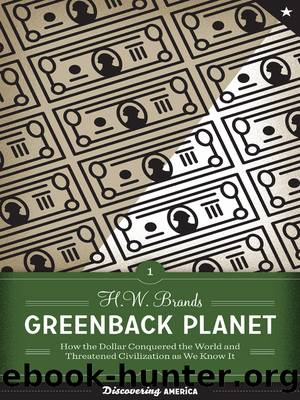Greenback Planet by H. W. Brands

Author:H. W. Brands [Brands, H. W.]
Language: eng
Format: epub
ISBN: 9780292735798
Published: 2011-07-14T16:00:00+00:00
Yet the dollarâs very success in promoting economic revival planted the seeds of challenge to the dollarâs hegemony. In Germany the revival took the form of the Wirtschaftswunder, or economic miracle, by which the Germans regained the dynamism and productivity that for decades had made them such a force in Europe. The new West German currency, the deutschemark, gained respectability under the watchful eye and rigid discipline of the Bonn government. A comparable revival, funded not by Marshall Plan money but by spillover spending from the Korean War, put Japan back in business. The Japanese, building on a smaller prewar base than Germany, trailed the Germans in most measures of economic strength, but they, like the Germans, served notice on the world that the dollar wouldnât have its way forever.
Another development suggested the same thing. The coordination George Marshall had demanded as a condition of American aid to Europe gave rise to the European Coal and Steel Community, a pooling of the heavy industries of Germany, France, Italy, Belgium, the Netherlands and Luxembourg. The coal and steel community ramified into the larger European Economic Community, often called the Common Market, which mimicked the secret of the American dollarâs early success: the existence of a large internal market for American products. The Common Market encouraged trade among members, allowing firms in each country to expand to optimal economic size, unconstrained by the political borders that heretofore had held them in. Politics didnât disappear; France kept Britain out of the Common Market until the 1970s. But politics no longer played the central role it once had, and the European economies flourished.
Meanwhile American self-confidence and ambitions continued to grow. The emergence of a Europe worth defending caused a critical mass of Americans, including two-thirds of the Senate, to put aside their countryâs long-standing aversion to peacetime alliances and endorse the North Atlantic Treaty of 1949. The North Atlantic Treaty begot the North Atlantic Treaty Organization, which featured an integrated military command. The United States naturally took the lead in NATO, paying most of its expenses and providing most of its troops. American forces took up permanent residence in Germany, France and other NATO countries, the better to deter a Soviet attack. Washington provided security guarantees to countries beyond Europe as well, including Japan, Taiwan, South Korea and Pakistan. The American commitment to Vietnam occurred more gradually but no less portentously, with the United States taking the place of France as the guarantor of South Vietnam against communist North Vietnam.
In ancient and early modern times empires were expected to pay for themselves. Persia and Rome exacted tribute from their vassal states; Britain extracted profits, initially via the East India Company, from its domain in South Asia. Whether the realm of influence America created in the 1940s and 1950s constituted an empire evoked debate, but even if it did, it differed from those previous empires in that it cost Americans much more than it returned. Yet Americans paid the bill, believing that the future of democracy depended on battling communism wherever that noxious ideology reared its head.
Download
This site does not store any files on its server. We only index and link to content provided by other sites. Please contact the content providers to delete copyright contents if any and email us, we'll remove relevant links or contents immediately.
Zero to IPO: Over $1 Trillion of Actionable Advice from the World's Most Successful Entrepreneurs by Frederic Kerrest(4568)
Machine Learning at Scale with H2O by Gregory Keys | David Whiting(4313)
Never by Ken Follett(3956)
Harry Potter and the Goblet Of Fire by J.K. Rowling(3857)
Ogilvy on Advertising by David Ogilvy(3622)
Shadow of Night by Deborah Harkness(3368)
The Man Who Died Twice by Richard Osman(3078)
Book of Life by Deborah Harkness(2939)
The Tipping Point by Malcolm Gladwell(2921)
Will by Will Smith(2919)
Purple Hibiscus by Chimamanda Ngozi Adichie(2853)
0041152001443424520 .pdf by Unknown(2845)
My Brilliant Friend by Elena Ferrante(2831)
How Proust Can Change Your Life by Alain De Botton(2814)
How to Pay Zero Taxes, 2018 by Jeff A. Schnepper(2655)
Hooked: A Dark, Contemporary Romance (Never After Series) by Emily McIntire(2554)
Rationality by Steven Pinker(2363)
Can't Hurt Me: Master Your Mind and Defy the Odds - Clean Edition by David Goggins(2341)
Borders by unknow(2313)
